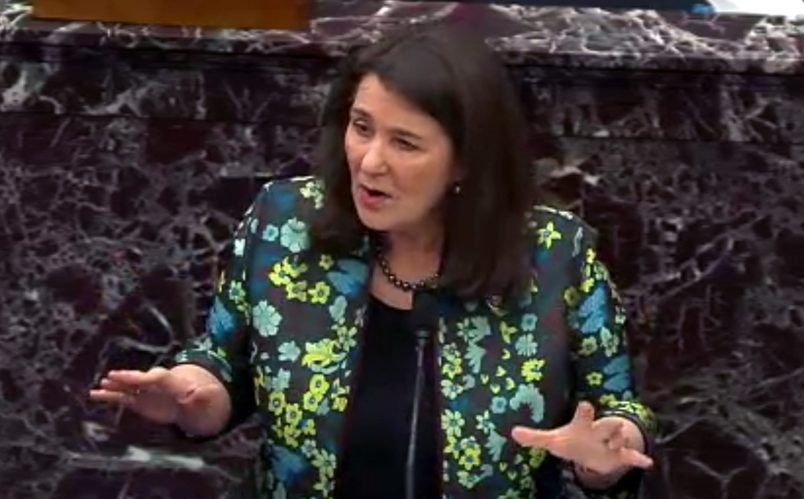Former President Trump played a pivotal role in the Jan. 6 mob on the Capitol turning violent, the House impeachment managers argued on Thursday, and failing to hold him accountable for his incitement will only encourage Trump to deploy similar tactics in the future.
If their Wednesday presentation was akin to a trial brief’s statement of facts — laying out, in precise detail, the events that unfolded in the lead-up to and during the riot— then Thursday was aimed at convincing the senators that those facts required them to disqualify Trump from future office.
The House managers made that case in a couple of different ways.
One major point of Thursday’s presentation was to drive home an argument that had been floated during Wednesday’s proceedings: Trump knew that the crowd that showed up in Washington on Jan. 6 was capable of violence. Rather than lower the temperature, the former president turned it up.
To emphasize that point, Rep. Jamie Raskin (D-MD) walked through what he called a “pattern” of Trump cheering on violence, rather than tamping it down. Those episodes included Trump’s praise for the white supremacists who held a fatal 2017 rally in Charlottesville, Trump’s endorsement of Greg Gianforte’s assault of a reporter, and Trump’s statements downplaying a 2020 far-right plot to kidnap and kill Gov. Gretchen Whitmer.
“He could not bring himself to publicly oppose a kidnapping and potential assassination conspiracy plot against a sitting governor of one of our 50 states?” Raskin said. “Trump knew exactly what he was doing in inciting the January 6 mob. Exactly. He had just seen how easily words and actions inspired violence in Michigan.”
Without Congress taking action via an impeachment conviction, Trump would have no reason to abandon the inflammatory tactics that. Trump’s seen them work out pretty well for him so far, House managers suggested.
“My dear colleagues, is there a political leader in this room who believes that if he is ever allowed by the Senate to get back into the oval office, Donald Trump would stop inciting violence to get his way?” Raskin asked. “Would you bet the lives of more police officers on that? Would you bet the safety of your family on that? Would you bet the future of your democracy on that?”
Another approach the House managers took was pointing to the other Republicans — some of them members of Trump’s administration — who had come to the same conclusion the managers were now asking the Senate to reach: that Trump’s conduct specifically was to blame for how the Capitol was ransacked.
Rep. Ted Lieu (D-CA) played clips of former top officials in Trump’s White House, as well as several Republican governors, expressing that view. He also read resignation letters from Trump cabinet officials who stepped down because of the former President’s role in inciting the violence.
Lieu’s presentation also emphasized the President’s lack of remorse and warned the Senate that failure to act would send the message that engaging in such conduct would continue to be appropriate.
“That is why President Trump is so dangerous. Because he would have all of us, all Americans believe that any president who comes after him can do exactly the same thing,” Lieu said.
Lieu’s arguments teed up a presentation by Rep. Diana DeGette (D-CO). She focused on how the extremists groups Trump had egged on had only felt more emboldened in the aftermath of the insurrection, rather than cowed.
She traced the argument back to one of the extremists who Trump amplified before Jan. 6. Video of the extremist Couy Griffin stating that “the only good Democrat is a dead Democrat” was retweeted by the President. Griffin then showed up to participate in the Jan. 6 mob. After the mob, Griffin previewed his plan to return to the Capitol on Inauguration Day, when he promised that there was “gonna be blood running out of that building.”
“In 2017 it was unfathomable to most of us to think that Charlottesville could happen, just as it was unfathomable to most of us that the capital could have been breached on January 6,” DeGette said. “Frankly, what unfathomable horrors await us if we do not stand up now and say ‘no, this is not American’.”







Watching the House managers superlative presentation, makes me proud to be an actual American patriot.
Next comes the T**** shit show…
The Democrats are doing an awesome job and clearly winning the battle of public opinion with their performance. No one expects a conviction, but this sets the stage to denounce, forever after, Trump’s defenders as enemies of the Constitution and all that America stands for.
Let those joining the sedition caucus reveal themselves.
Not during the trial, but outside of it, someone should inform the Republicans that ,“We are taking names”.
This is from the Trump playbook so it is fair.
They can deflect, but there is a cancer that has eaten the GOP and there are few remains left.
The basic problem of course is that the Republican party is a terrorist organization comprised of diffuse cells. No, that does not mean all Republicans are terrorists. The cancer grew up too fast for almost all to wrap their heads around this. But the GOP Senators are deeply embedded with the cancer.
I am proud to see Dianna DeGette. She and I went to the same college and we lived in the same neighborhood when she was first elected to Congress.